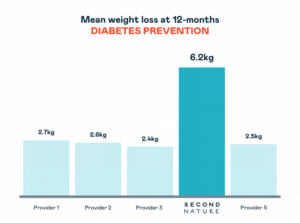Jump to: Four reasons why dieting doesn’t work | Diets are overly restrictive and rigid | Diets try to change too much, too soon | Diets only have a short-term focus | Diets just tell you what to do | Take home message
Here are four reasons why dieting doesn’t work
- Diets are overly restrictive and rigid: Research shows this makes us crave foods more, leading to overeating.
- Diets try to change too much, too soon: Some people can make wholesale changes overnight, but most of us can’t. Slow and steady wins the race.
- Diets only have a short-term focus: Short-term gains make you think it works, but you don’t learn how to sustain a healthy lifestyle, and the vicious cycle of falling and jumping back on the wagon begins.
- Diets only tell you what to do: This is only one small element of a complex puzzle. You also need to know the how and the why behind your behaviours.
You might think, “diets do work, I just can’t stick to them”, or “it’s not the diet that’s the problem, it’s me” – and you’re not alone in thinking this.
However, research shows that dieting doesn’t work for most people in the long term.
One study found that 80% of people who lose weight on a diet regain the weight they lost after one year. After two years, 85% regained, and after three years, 95%.
This guide has an essential message: it’s not your fault; you haven’t failed; the diet failed you.
You might be thinking it’s down to your lack of willpower, motivation, or simply that you’re just someone who’s destined to fail.
To reiterate, that’s not the case. In this guide, we’ll outline four key reasons why diets fail and what you can do instead to have a successful weight loss journey in the long term.
At Second Nature, we do things differently. We don’t believe in quick-fix solutions and crash diets that leave you hungry, deprived, and miserable.
We believe in providing you with evidence-based information along with the support of a registered dietitian or nutritionist who’s with you every step of your weight loss journey.
If you’d like to join over 150,000 others who’ve joined Second Nature and found liberation from constant yo-yo dieting, click here to take our health quiz.
Otherwise, keep reading as we analyse the four key reasons dieting doesn’t work.
Medication-assisted weight loss with a future focus
Start with Wegovy or Mounjaro, transition to habit-based health with our support


1) Diets are overly restrictive and rigid
When we overly restrict our energy intake, our brain responds by sending signals to our body to encourage us to overeat.
After all, one of our brain’s main jobs is to keep us alive. So when we restrict our intake too much, our brain thinks we’re in danger and will overcompensate.
Consider the scenario when you try to hold your breath for an extended period.
The first thing you do when you can’t hold it any longer takes huge, deep breaths. Your brain does this automatically without you even thinking about it.
Our brain works in the same way with food. We can think of it as a pendulum effect: the more we restrict, the easier it is to overeat.
The white bear effect
Another reason why strict diets fail is something known as the white-bear effect. Consider this, if I tell you not to think about a white bear, what do you think about? You’re probably thinking about a white bear.
Ironically, when you try to tell yourself not to think about something, the opposite happens, and the thoughts become more accessible in your mind.
So, when you’re on a new diet, and you’re being specifically told to avoid specific foods because they’re ‘bad’, you tend to think about them more, and eventually, the cravings for them become too great that you end up overeating.
Severe calorie restriction can impact your fertility
A final word of caution if you’re considering a strict diet. Research has shown that when females restrict their calorie intake significantly, it can harm their menstrual cycle and lead to infertility.
Fortunately, studies have shown this can be reversed when women return to eating enough energy (calories) – but the long-term effects of severe caloric restriction are not fully known.
The Second Nature approach: We offer flexibility
We’ve designed a way to lose weight without over-restriction and constant feelings of hunger. We’ll never tell you to cut out whole food groups or meet strict calorie targets.
Instead, we help you find a way of eating that you can truly enjoy for the long term and that helps you reach your weight loss goals.
Trust us, it’s possible – 90% of people on our programme lose weight and keep it off for 12 months.
Research published in the BMJ showed that Second Nature was more than twice as effective at supporting weight loss in the NHS Weight Management programme after 12 months.

Key points:
- Diets are overly restrictive, which results in a starvation response by the brain, which encourages you to eat more and over consume energy.
- Strict dieting also plays into the white bear effect, which states that if you try to avoid thinking about something, those thoughts become more accessible.
- Strict dieting can also impact female fertility and menstrual cycles.
- Second Nature provides more flexibility and doesn’t lead to the same negative consequences of strict dieting.
2) Diets try to change too much, too soon
Think about learning to ride a bike – we must learn to coordinate our feet, steer, use the brakes, and keep our eyes on the path. We might need stabilisers; to begin with, we might fall or crash. It’s challenging to learn many things all at once.
If we try too much too soon, our brain learns nothing, and we give up before we succeed. This often happens when we start a new diet because we’re pushed to change everything immediately.
But research shows that trying to build several new habits at once is unhelpful. You may have heard the phrase, “we have to walk before we can run”, which is true of weight loss and long-term behaviour change.
Taking small steps and gradually moving in the right direction is a much more effective way of losing weight in the long term.
The Second Nature approach: We help make changes at a pace that suits you
We know that the ‘all or nothing’ approach doesn’t work. Instead, small and consistent changes over time will lead to significant results.
For example, if you eat two portions of vegetables a day for a year, you’ll eat a total of 730 portions of vegetables. If you eat five vegetables a day but you can only do this for four weeks before giving up, you’ll only have eaten 140 portions of vegetables.
Key points:
- Weight loss and long-term behaviour change are like riding a bike; you have to learn the skills gradually before becoming a master.
- Research shows that individuals who try to change too much too soon often fail and give up entirely.
- At Second Nature, we encourage you to make gradual changes you can sustain in the long term.
3) Diets only have a short-term focus
You might be used to trying to change everything at once, but we don’t recommend this approach. You may not want to hear this, but the scientific evidence is clear: creating new habits takes time.
Unfortunately, most diets only focus on the short term, which is why they can trick us into thinking they ‘work’. We know it can be tempting to follow a diet that promises enormous results straight away, but those results often come from living in an unsustainable way.
Reflect on your own dieting experience. If diets worked, would you be reading this article? Would you still be looking for a new diet to try and lose weight for good?
You’re probably here because you’re looking for something different that will get you where you want to be.
The Second Nature approach: We focus on the long term
Our programme is different because we’ll provide the support you need for up to 12 months (and longer if needed). This is because we know maintaining the changes you’ve made and the weight you’ve lost is often the most challenging part.
We understand that life can get in the way, and your motivation will go through highs and lows, but regardless of this, we’ll always be here in the background to support you.
Second Nature doesn’t require ‘perfection’ for a short period. Instead, we recommend small improvements over a longer time. This is the way to make changes that last.
We have registered dietitians and nutritionists to support you five days a week. They’re there to help you when you need them most.
There’s no falling off the wagon here. The most challenging moments in our lives are often the ones we can learn from and grow as human beings.
Key points:
- Diets are designed to help you lose weight quickly in the short term to convince you they work when in reality, they’re designed to fail in the long run.
- Second Nature focuses on the long term, so you can look forward to a healthier life for many years to come.
4) Diets just tell you what to do
Most diets tell us what to do, not how to do it – or, more importantly, how to keep doing it forever.
If it were as simple as knowing what to do, the diet industry wouldn’t be worth billions and have such disappointing outcomes. We also wouldn’t see so many people with lifestyle-related health problems.
Knowing what to do is only one piece of the puzzle. The most critical piece is understanding how to manage our barriers and challenges to succeed in the long run.
Scientific research shows that strict dieting practices are associated with overeating, weight gain, and an increased desire to seek food reward.
So, while we’ve been conditioned to think these are the behaviours we need to do to succeed, the opposite is true.
The Second Nature approach: We don’t just tell you what to do; we’ll help you understand the why and show you how to do it
Think about the things that can get in the way of us eating well.
- Unhelpful nutrition advice
- Time
- Life stress
- Emotions
- Social events
- Work
- Family
- … the list is endless!
But we won’t just tell you what to do and let you try and do it alone – we’ll give you the right skills and support to manage challenging situations.
And by ‘managing’, we don’t mean depriving yourself of the things you love. Instead, we mean learning to enjoy life in a way that keeps you happy and healthy.
We focus on your values
We all like goal setting, but for what purpose? It’s often weight loss for a wedding or hitting the gym to get a flat stomach.
Many of these goals are driven by external (or extrinsic) motivations, where the motivation to continue will wane when you’ve hit the goal.
For example, you set a goal of losing one stone for a wedding in March. You go on a crash diet, lose weight, and go to the wedding. In the months after, the weight is regained as you return to your old habits.
What have you gained from this? Not much, in truth.
Let’s look at it from a different angle. You set a goal that you’d like to lose one stone over the next six months because you value your health, and you feel that doing this will enhance your quality of life.
You’ll feel stronger, fitter and more independent, and you might have more energy to spend time with your loved ones.
These are all internal (or intrinsic) motivations to lose weight that will keep you motivated for longer and improve your chance of success for long-term behaviour change.
How to identify your values
- Name a time when you were truly happy.
- What was it about that situation that made you feel so happy?
Here’s an example (values highlighted):
- I was happiest when I hiked the three peaks with my friends last year.
- I felt so happy because I was outdoors; I felt free, it was adventurous, and I got to spend quality time with my friends free of distraction.
From this example, we can identify the following values:
- Freedom and independence
- Accessing the outdoors and nature
- Adventure
- Friendship
- Being present, mindful, and not distracted
If goals are the destination (the what), our values are our compass (the how and why). They’ll guide future decisions and how we want to live our lives.
This is why Second Nature is different. We help you understand yourself better than you ever have done before. We’re here to help you lead a life you want to rather than a life you feel like you have to.
Key points:
- Knowing what to do is only a tiny part of a weight loss journey; you need to understand how and why you should do it.
- Second Nature supports you in managing challenging barriers to a healthy lifestyle with evidence-based support and advice.
- We also help you understand your internal values and how these can support you achieve your goals in the long term.
Take home message
We often blame ourselves for not being able to stick to a diet. In reality, the diet’s the issue, not us.
But research shows that 95% of people who go on a diet regain all the weight they lost within three years.
Diets fail for several reasons, including being overly restrictive and rigid, encouraging us to change too much too soon, only having a short-term focus, and simply telling us what to do, not how to do it.
Understanding why diets fail is why we approach weight loss differently at Second Nature.
If you’d like to try a 7-day Second Nature meal plan trusted by the NHS and see what it feels like not to be on a diet, click here.


